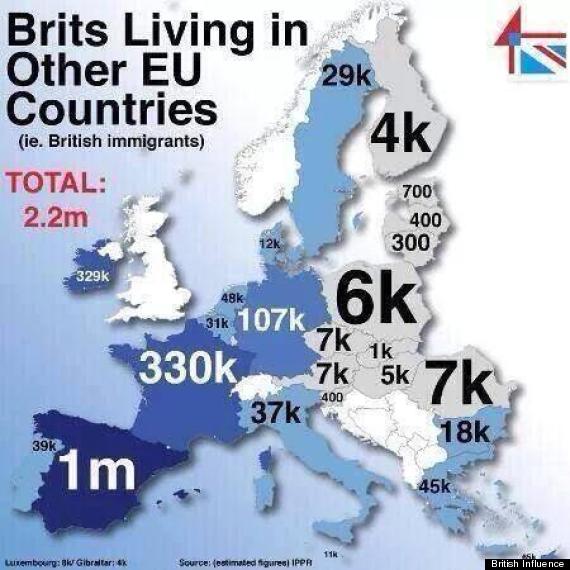I have to say as an American, this is a development I never took seriously. When I first started reading in 2014 about the United Kingdom’s referendum on its European Union membership, I thought it would be a formality. I never dreamt that extreme nationalists such as Nigel Farage would carry the day with Brexit.
Because here’s one complication that never really got the attention it deserves:
The World Bank estimates there are at least 5.5 million British citizens living abroad. Suddenly, almost half of those people are looking at a dramatic change in immigration status.
Brits are well known for their attraction to sunny climes, making up the largest percentage of the European expat population. But their numbers in each EU country are difficult to verify simply because the British Office for National Statistics doesn’t compile that data.
 The best numbers I could find are:
The best numbers I could find are:
• nearly 1 million UK citizens in Spain. According to a post in the statistical journal Significance, the 2007 Spanish census identified about 270,000 Brits as permanent residents. That number rises to about a million when you add the estimated population of unregistered UK citizens
• at least 300,000 in the Republic of Ireland, and about 385,000 Irish citizens live in Britain
• perhaps 300,000 Brits in France, particularly the Dordogne region around Nice
• at least 100,000 in Germany
• maybe another 200,000 total in Portugal and Greece
More than once, Dispatches Europe has been accused of First World semantical bias because we label as “expats” the skilled technical workers and managers who are corporate nomads. Of course, what we all really are is migrants. And suddenly, that exalted status that comes with an international career is in question if you happen to be a citizen of the United Kingdom. Because as of today, you’re no longer a citizen of the European Union
(Of course, the status of EU citizens in the UK such as Poles just got more complicated, but that’s a post for another time.)
The Significance post goes straight to the heart of the issue:
The ratcheting up of the immigration issue has partly led to David Cameron promising to radically renegotiate Britain’s membership of the EU. If that comes to pass, it’s the British people in the data above that he needs to consider rather than the phantom Romanian horde. Changing attitudes in the immigration debate is a monumental uphill battle when you consider how far perception is from reality. As part of a survey the RSS commissioned from Ipsos MORI last year, people were asked what percentage of the British population they thought were immigrants? The collective answer was 31%. The actual figure is 13%.
Even more confusing, another poll from Comres asked if all citizens of other EU countries should have the right to live and work in the UK? Only 36% agreed, against 46% who disagreed. The pollsters then asked a different question – should British people be free to live and work anywhere in the EU? This time 52% agreed with only 26% disagreeing. It seems the British want to have their gâteau and eat it.
Unfortunately for many, they may be back in Britain eating their gâteau in the rain and wondering what hit them. I had dinner this week with a British couple based here in the Netherlands who told me they’d been gone from the U.K. so long they were no longer eligible to vote. They would have voted to stay in the EU. Now they and so many others across Europe are wondering how all this plays out post-Brexit.
I was Facebook messaging this morning with recent contributor Laura Plested Kaye, who wrote this heartfelt plea to undecided fellow Brits to vote “stay.”
Now, Laura told me she’ll be researching how Brexit will impact UK citizens in the EU, adding, “I think we’re safe for a couple of years because there’s a grace period.” Britain and the European Union have a two-year timeframe to decide the fates of their now-alien populations.
Laura is not, she said, looking forward to the possibility of going through the German visa application process.
Then there are the unintended consequences neither the Stay nor the Leave camps discussed in any meaningful detail including the exit of Scotland – and possibly Northern Ireland – from the United Kingdom.
Scottish First Minister Nicola Sturgeon stated her Scottish National Party would push again for secession if Britain chose to leave the EU. “The vote here makes clear that the people of Scotland see their future as part of the European Union,” Sturgeon was quoted as saying in the media. “We await the final U.K.-wide result, but Scotland has spoken – and spoken decisively.”
The vast majority of Scots voted to stay … 62 percent to 38 percent, according to the Telegraph. Now the question is, “Who’s a Scot?” Does that mean there could be a migration out of an independent EU-affiliated Scotland into England?
On the UK side of the border, outgoing Prime Minister David Cameron refused to rule out the possibility of EU citizens being deported. Which of course would provoke retaliation from Spain to Finland.
Post-Brexit UK policy will have severe repercussions on the multinational corporations who battle for international talent and are – at the end of the day – agnostic when it comes to national allegiance. That could be the stabilizing influence in all this as the global banks such as HSBC, which opposed Brexit vehemently, lobby Messrs Johnson and Farage to back off a bit as the pound plunges and the British equity markets falter.
They haven’t listened so far. Will they listen now?
Please feel free to weigh in with your observations and criticisms.
Co-CEO of Dispatches Europe. A former military reporter, I'm a serial expat who has lived in France, Turkey, Germany and the Netherlands.















